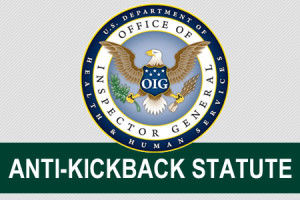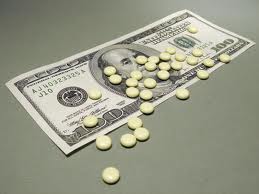The Government’s Unrelenting Reliance on Anti-Kickback Prosecutions
 Below the radar screen of aggressive FCPA enforcement, US Attorneys, HHS-OIG and State Attorney Generals are pushing an aggressive agenda using federal and state anti-kickback laws. It is hard to keep it all in perspective but for companies falling under the federal healthcare system it is a constant worry.
Below the radar screen of aggressive FCPA enforcement, US Attorneys, HHS-OIG and State Attorney Generals are pushing an aggressive agenda using federal and state anti-kickback laws. It is hard to keep it all in perspective but for companies falling under the federal healthcare system it is a constant worry.
The AKS was enacted in 1972, and since then, it has been used to prosecute health care providers and corporations for providing and accepting bribes and kickbacks related to patients in federal health care programs (Medicare, Medicaid, TRICARE, VA).
The law is fairly straightforward — anyone who knowingly and willfully receives or pays anything of value to influence the referral of federal health-care program business, including Medicare and Medicaid, can be held accountable for a felony. Under recent amendments passed as part of the Patient Protection and Affordable Care Act, a person need not have actual knowledge that the alleged activity violates the Anti-Kickback Statute or that there be a specific intent to commit a violation of the Anti-Kickback Statute.
Healthcare companies falling under the jurisdictional hook of “federal healthcare programs” face significant risks of AKS and False Claim Act prosecutions. AKS and FCA prosecutions threaten companies with trebled damages and possible exclusion from federal healthcare programs, the equivalent of a death sentence for pharmaceutical and medical device companies and healthcare providers, especially hospitals. As a result, healthcare companies cannot fight the government by challenging the case in court. They face the age-old predicament – settle or else face extinction.
The government is well aware of this calculus and exercises its authority to extract significant settlements and impose detailed requirements for compliance and remediation.
In the past year, AKS enforcement has been steady and strong. The government settled a record case for $2.2 billion from Johnson and Johnson. In addition, the list of defendants fell along a broad cross-section of healthcare industry companies, including clinical laboratories, and a physician-owned hospital. Amgen settled an AKS case for $24 million involving bribes paid to pharmacy companies in return for implementing “therapeutic interchange” programs designed to switch Medicare and Medicaid beneficiaries from a competitor drug to Amgen’s competing drug. Late in the year, dialysis company DaVita recently announced a reserve of $300 million to settle a long-running AKS investigation.
The Johnson and Johnson settlement is an important reminder of what can occur when there is a systemic breakdown in AKS compliance. The settlement included significant off-label violations but also involved AKS violations, including payments to physicians for speeches in exchange for commitments to increase prescriptions of a specific drug.
J&J also paid kickbacks to Omnicare, the largest long-term care pharmacy provider. J&J paid millions of dollars in kickbacks to Omnicare under the guise of market share rebate payments, data-purchase agreements, “grants” and “educational funding.” These kickbacks were intended to influence Omnicare and its hundreds of consultant pharmacists to promote the use of J&J drugs in nursing homes.
In addition, J&J urged doctors and hospitals to establish outpatient clinics to administer a J&J drug, even providing funds to defray the costs of setting up the clinics, and supplied providers with extensive resources and support for billing Medicare for the outpatient infusions
 Aside from the corporate settlements, the Justice Department has been aggressively charging executives for AKS violations.
Aside from the corporate settlements, the Justice Department has been aggressively charging executives for AKS violations.
In a series of cases against clinical laboratories, three former executives plead guilty in two separate cases for AKS violations. In one investigation, prosecutors charged a number of former executives and employees with a long-running scheme to bribe doctors to refer patient blood samples to their company and order unnecessary tests. In addition, the company leased space from doctors at “above-market” rates as another means to compensate the physicians for the referrals.















